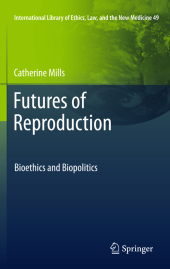 Neuerscheinungen 2013Stand: 2020-01-07 |
Schnellsuche
ISBN/Stichwort/Autor
|
Herderstraße 10
10625 Berlin
Tel.: 030 315 714 16
Fax 030 315 714 14
info@buchspektrum.de |

Catherine Mills
Futures of Reproduction
Bioethics and Biopolitics
repr. 2013. 2013. X, 134 p. X, 134 p. 235 mm
Verlag/Jahr: SPRINGER NETHERLANDS 2013
ISBN: 9400736339 (9400736339)
Neue ISBN: 978-9400736337 (9789400736337)
Preis und Lieferzeit: Bitte klicken
One of the first publications to synthesize reproductive ethics and post-structuralist philosophy, this monograph offers insightful discussion of key issues in reproductive ethics such as liberal eugenics, human enhancement and disability discrimination.
Issues in reproductive ethics, such as the capacity of parents to ´choose children´, present challenges to philosophical ideas of freedom, responsibility and harm. This book responds to these challenges by proposing a new framework for thinking about the ethics of reproduction that emphasizes the ways that social norms affect decisions about who is born. The book provides clear and thorough discussions of some of the dominant problems in reproductive ethics - human enhancement and the notion of the normal, reproductive liberty and procreative beneficence, the principle of harm and discrimination against disability - while also proposing new ways of addressing these. The author draws upon the work of Michel Foucault, especially his discussions of biopolitics and norms, and later work on ethics, alongside feminist theorists of embodiment to argue for a new bioethics that is responsive to social norms, human vulnerability and the relational context of freedom and responsibility. This is done through compelling discussions of new technologies and practices, including the debate on liberal eugenics and human enhancement, the deliberate selection of disabilities, PGD and obstetric ultrasound.
1. Introduction
Disability, Gender and Selective Termination
Liberal Eugenics
What is biopolitics?
2. Normal life: liberal eugenics, value pluralism and normalisation
Introduction
Shaping People: human enhancement and normality
What is normalisation?
The vitality of social norms
Conclusion
3. Reproductive autonomy as self-making
Introduction
The presumptive priority of reproductive liberty
Enacting freedom: the ethical practice of reproductive autonomy
Conclusion
4. The limits of reproductive autonomy: prenatal testing, harm and disability
Introduction
Disability, harm and the non-identity problem
The expressivist critique of prenatal testing: a defense
Conclusion
5. Reproducing alterity: ethical subjectivity and genetic screening
Introduction
Genetic selection and ethical self-understanding
Natality, corporeality, singularity
Screening singularity
Conclusion
6. Ultrasound, embodiment and abortion
Introduction
Ultrasound images and the sympathetic imagination
The social production of sympathy: biopolitical reproduction
The ethical demand of embodied appearance: relationality and responsibility
Conclusion
7. Final Remarks


